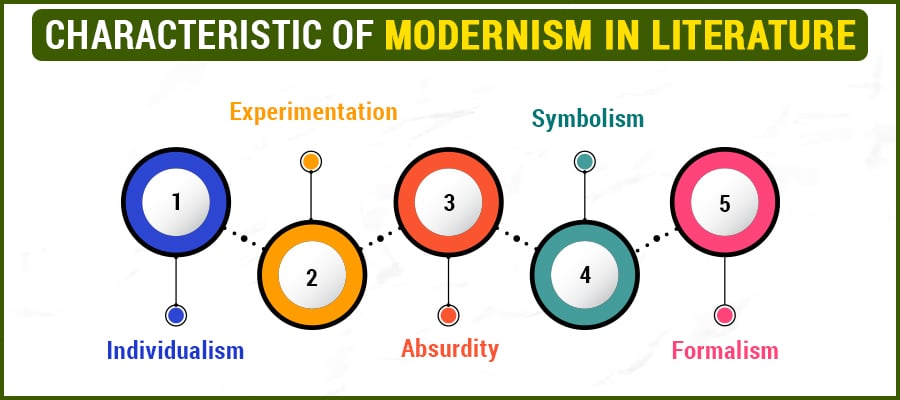 Offers
New
Order Now
Offers
New
Order Now
Modernism is a historical period that started in the late 1800 to early 1900 century. In this period, literature had a revolution because writers began to write with unique concepts and ideas. Modernist writers use different types of storytelling and narrations in their literature. This fundamental ripped off the books and initiated a new aspect of story expression. Modernism in literature is an act of rebellion against the writer's part.
Modernists wrote in free verse so that they could include several countries and their cultures in the poems. Writers used various concepts and points of view to write their drafts. It is so because they want to be flexible and appreciated by the readers. In this blog, we will discuss the meaning and characteristics of modernism in literature.
To solve the query of what is modernism in literature? It signifies a dynamic shift of culture that took root in the late 19th and early 20th century. This way of literature was a rebellion against Victorian literature. Writers have used various styles of writing to indulge the readers. Modernist literature has captured many hearts over the past century. We have mentioned several aspects of the literature below.

Modernistic literature has several elements that help in the better flow of writing. Individualism and experimentation are crucial aspects of literature because they are constant and unique.
Individualism is a crucial characteristic of modernism in literature. It focuses on the persons experiences, ideology, and emotions that are more opt than the functions. Modernism is focused on describing the subjective reality. A typical protagonist in literature is just trying to survive and adapt to mould the world. If you conduct research, you can find compelling examples in the work of Ernest Hemingway. The preoccupation with subjective reality has resulted in the creation of untrustworthy narrators in fiction. Franz Kafka's works provide excellent examples of the Madman kind of unreliable narrator.
Modernist literature rejects several established writing norms. It helps to pave the way for experimentation with the forms. Modernist writers define it: they protest against the rules of rhyme and rhythm. Modernism in literature initiates experiments with prose. This phenomenon is combined with individualism as another core. This device is intended to represent how the characters think, even if it is inconsistent, chaotic, or illogical. These new techniques enabled writers to create novels that resembled the protagonist's stream of consciousness.
In the modernist era, authors watched the world as they knew it shifted around them. During the Second World War, the rise of capitalism and globalization of all the writer's beliefs and opinions. This prompted many of them to think the world ludicrous and express it in their work. Modernist paintings based on this feature take surrealist or fantastical turns from start to finish. They can also be referred to as weird or illogical. The emergence of absurdism also resulted in the invention of the Theatre of the Absurd. It was pioneered by European playwrights and is based on the premise that human existence has no grand significance or purpose. Absurdist plays do not attempt to communicate adequately; rather, they use nonsensical rhetoric.
Symbolism is a crucial characteristic of modernism in literature. It existed in the literature before the late 19th century. Modernist writers and poets have also re-imagined the symbolism. However, this does not imply that there was no attention to detail. On the contrary, modernist authors injected symbolic nuances into every stratum of their story. The difference was that their use of symbolism in writing allowed for multiple readings, all possible and valid. Writers preferred to leave plenty of blanks for the readers so that their imagination could fill them.
In the 20th century, modernism was associated with the search for radical new ways of expression. Modernist writers have creativity fueled in their search, which paves the way for emergencies of the original forms. In modern period literature, writing was no longer regarded as a crucial craft. They viewed it as a creative process. In some aspects, the novelty of the form was valued more than the substance. Consider the works of E.E. Cummings as an example. Instead of writing the poetry on the page in the traditional manner, he spread out individual words and phrases across the page as if it were a canvas with his poem as the paint.
These key characters are helpful to write a unique literature and helps to analysis the work of famous writers. Now, we will discuss some of the interesting modernist literature topics. These will help you to understand the way of this era of writing.
Modern literature, with its innovative methods, has literary devices and unconventional narratives. It is initiated by various recurrent theme which reflects time and societal transformation. Modernist themes also offer a crucial understanding of modernist movements. These aspects leave spirit and a lasting impact on literary history. You can mention these details in your work if you face issues getting online assignment help from our experts.
A vital theme in modern literature is a deep sense of alienation and disillusionment. Elements in modernist work often have the feeling of detachment and rootlessness. It denotes a feeling of adrift in the society that increases in impersonal. They are sometimes disgruntled with cultural norms and institutions, trapped in a world that has strayed from the traditional values they formerly held dear. This leads to a strong sense of loneliness as they seek meaning and purpose in an ever-changing environment that appears weird and unpleasant. These statements reflect the rough societal shift and profound distrust in institutes that identify the era.
Loss of faith is another recurring modernist theme in literature. Characters often struggle with the crisis of belief, which can be ideological or religious. This dilemma causes severe existential distress in many modernists and writers, as they fear a loss of clear purpose or meaning in their lives. This existential dread is frequently expressed through characters doubting their existence, societal roles, and the distinguishing meaning of life and human existence. They face tremendous doubts, and their disappointment leads to a rejection of previously held ideas and values. These components are one of the vital aspects of the modernist environment.
Modernism in literature is divided by global uncertainty and ambiguity. These types of documents lack a transparent moral centre. It also helps to mirror the perceived absence of total truth in the rapid growth of society. They push the reader to navigate moral and interpretive uncertainty by presenting different perspectives, fractured narratives, and open-ended conclusions. This feature of modernist writing emphasizes the underlying uncertainty of life, reflecting the complicated, multilayered realities of a changing world.
These interesting modernist literature theme is famous for there role in the world of books. You can use this style of writing to initiate the work. Now, we will discuss some of the classic work done by modernist writers. Several writers have put their devotion and knowledge into creating some prominent literature.
Try our essay typer tool!There are several modernist writers in the 20th century. Some of them were famous because of their derived knowledge. We have mentioned some renowned writers who possess infinite resources and ways of expressing a story.
This draft was written during the First World War and focuses on the men and women working on the trams in Nottingham. “Tickets Please” identifies the shift of gender roles in the early twentieth century. The latest desires and impulses with the detailed analysis had lain bare. Another reason to read this story is the protagonist is named John Thomas, after the slang for ‘penis'.
This story has been describes as a satire on literary modernism and simply a joke. It is recounted by a strange and self-absorbed critic for a fictional newspaper; this narrator is informed by a leading novelist, Hugh Vereker, that he, Vereker, has concealed a 'secret' throughout his work. Every one of his works has this secret, which, like a thread in a Turkish carpet, is so neatly woven into the fabric of the narrative that only the most astute reader will notice it. This story has crucial aspects that you can mention in your work. If you face issues, hire a homework helper from our portal for the best results.
It was just an ordinary day during June of 1923. This novel remains among the most prominent examples of modernism in English literature. Two famous works of Virginia Woolf are: a biography titled Mrs Dalloway and another famous text called To the Lighthouse. Nonetheless, Woolf held some reservations about Joyce's preoccupation with what she considered to be the grimmer aspects of life - sexuality and bodily functions - even going so far as to declare that Ulysses was like ‘a sickening undergraduate with itchings”. Consequently, her style regarding such type of writing would be dissimilar.
Woolf's Mrs Dalloway was not first demonstrated to us in Mrs Dalloway (1925). Her first published work was The Voyage Out which came out in 1915 and also featured her for the first time on a printed page.
So, after reading so much about modernism in literature have cleared your doubts. However, if you want to know more about it, our experts can help you in certain aspects.
Buy Our Academic Writing Services and Get Quick Help from Our Experts to Fetch HD Grades.
Our Experts are renowned for their knowledge and expertise. They have experience in multiple fields and theory papers. They can provide you with assignments, thesis, and essay writing help so that you can score positive results in academics. Global Assignment Help Australia has been trusted and in function for a prominent period. We have served students and assisted them in their work. If you want to know more about literature, ping us, and our support team will get back to you.
Modernism in literature is a derived topic that consists of several elements and derived history. People in the early 20th century were obsessed with this format of writing because it was revolutionary.
You may also like to read:

Grab this exclusive offer and start your journey to savings today! Act quickly, as this special offer won't be around for long!

This blog explains what is a hyperbole, provides engaging examples, & explores how to use hyperbole.

Explore 150+ funny debate topics to spark laughter, creativity, and lively discussions in 2025

Cross-Sectional Study basics explained with steps, examples, and comparisons.
Limited Time Offer
Exclusive Library Membership + FREE Wallet Balance
1 Month Access !
5000 Student Samples
+10,000 Answers by Experts
Get $300 Now
Update your Number
